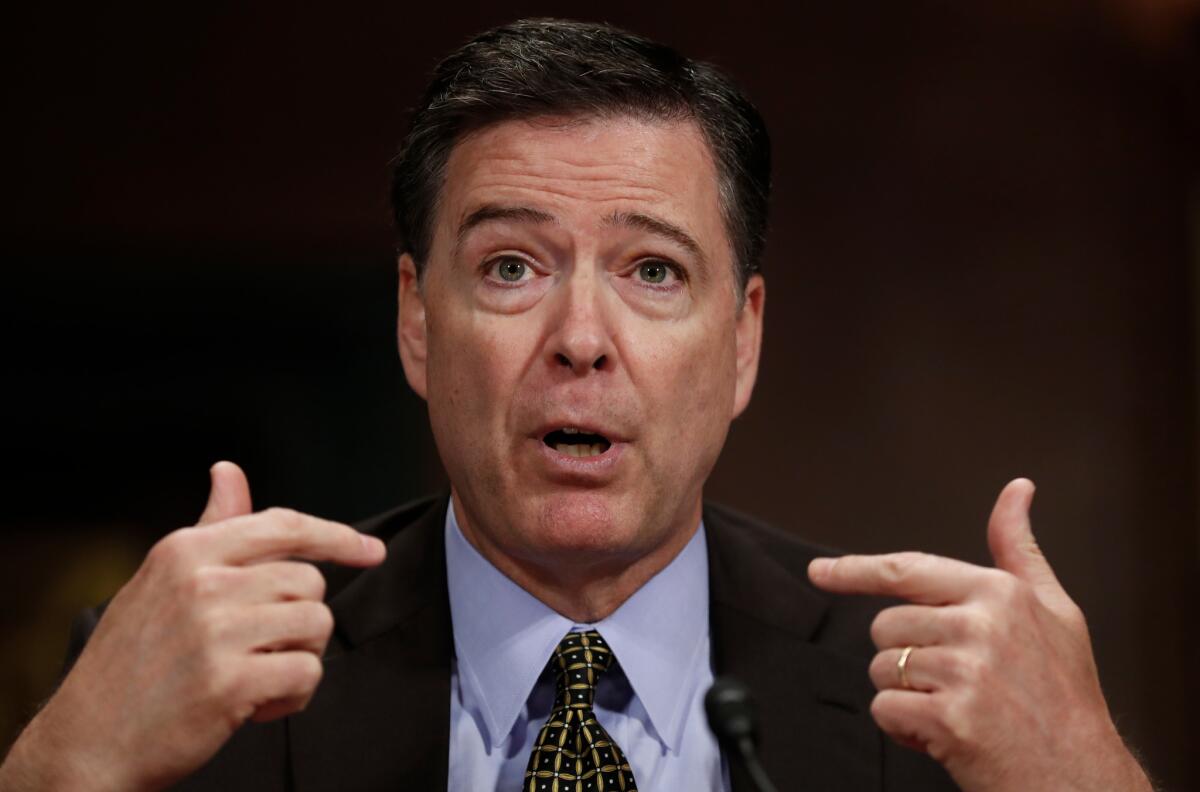Justice Department decides not to prosecute James Comey over release of his memos

- Share via
WASHINGTON — The Justice Department has declined to prosecute former FBI Director James B. Comey for mishandling confidential memos he wrote documenting his interactions with President Trump, according to a person familiar with the matter.
Prosecutors were acting on a referral from the Justice Department’s inspector general, Michael Horowitz, whose office has been investigating the genesis of the federal probe into Russia’s meddling in the 2016 election. The disclosure of Comey’s memos after he was fired in May 2017 spurred then-Deputy Atty. Gen. Rod Rosenstein to appoint Robert S. Mueller III as special counsel overseeing the Russia investigation.
Horowitz looked at allegations that Comey had mishandled classified information when he showed a copy of a memo to a longtime friend, Daniel Richman, a Columbia University law professor.
Prosecutors determined that the allegations were too weak to take to court, according to the person familiar with the decision.
One question concerned whether Comey was aware that some sentences in the memos included classified material. Security officials determined that two of the memos had the lowest level of classified material in them, but the determination to designate them as “confidential” came only after Comey had disclosed their contents. Comey testified before Congress that he wrote the memos in a way to ensure they did not contain classified information.
Comey wrote seven memos about his interactions with Trump. They started with his briefing of the president-elect at Trump Tower on Jan. 6, 2017, about the contents of a controversial and salacious dossier by a former British spy about Russia’s meddling in the election and its dealings with the business mogul.
The former FBI director said he wrote the memos after interactions with Trump because he knew he “would need a record of what had happened, not just to defend myself, but to defend the FBI.”
“It was a combination of circumstances, subject matter and the particular person,” Comey told Congress in June 2017.
Comey testified he kept the memos in a safe at his home and showed one to Richman so he could describe its contents to a New York Times reporter. The resulting article documented how Comey believed that Trump had tried to improperly pressure him in the Oval Office to drop an investigation of former national security advisor Michael Flynn.
“I hope you can see your way clear to letting this go,” Trump told Comey, according to the memo.
“I thought [the disclosure of the memo and its contents] might prompt the appointment of a special counsel,” Comey testified.
Richman, who represents Comey, declined to comment on the decision not to prosecute the former FBI chief. “We strongly suggest you wait for the [inspector general’s] final report,” Richman wrote in an email.
Trump has denied he pressured Comey to go easy on Flynn, who later pleaded guilty to making false statements to FBI agents and cooperated with Mueller’s investigation. Trump has repeatedly blasted Comey and other FBI officials for being out to get him and undermine his presidency.
The president has also pushed the Justice Department to investigate agents and prosecutors who led the initial investigation into Russian interference in the 2016 campaign and whether the Trump campaign conspired with the Kremlin to tilt the election.
In addition to Horowitz’s investigation, Atty. Gen. William Barr has launched an internal review of how the FBI, Justice Department and intelligence community handled the Russia probe.
Mueller’s team concluded that Russia had sought to interfere in the election in Trump’s favor but did not establish a conspiracy between the Trump campaign and Moscow. It found numerous instances in which Trump sought to interfere in the special counsel’s probe. Barr ultimately cleared Trump of obstructing justice, however, saying the president’s actions had been justified by his frustrations.
Horowitz, the Justice Department’s top internal watchdog, is expected to issue his findings on how the FBI and Justice Department handled the Russia investigation in coming months.
More to Read
Get the L.A. Times Politics newsletter
Deeply reported insights into legislation, politics and policy from Sacramento, Washington and beyond. In your inbox twice per week.
You may occasionally receive promotional content from the Los Angeles Times.










